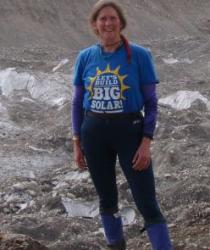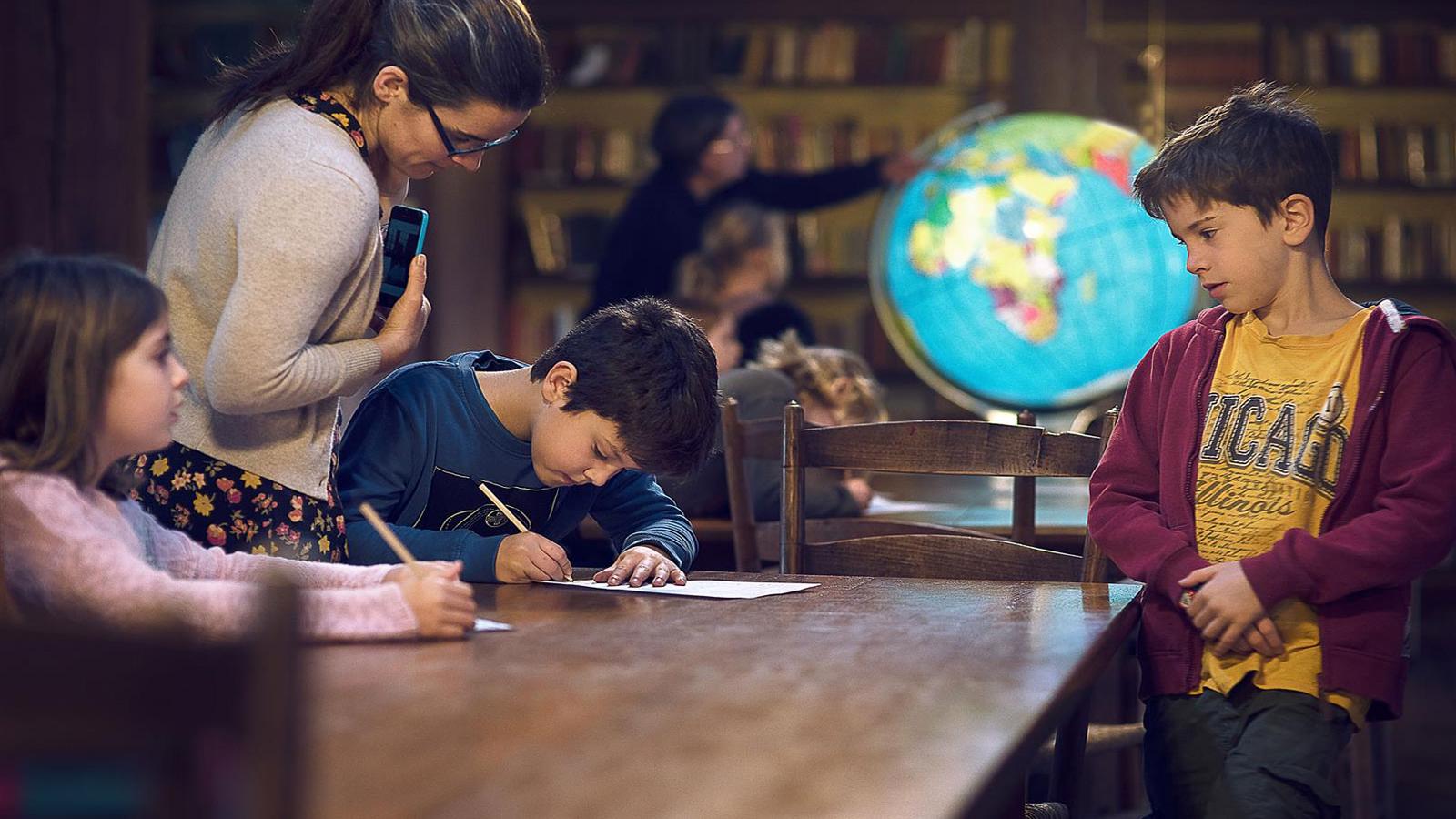
In many ways, it might seem to the casual onlooker that Philippa Rowland was born for Bedales. There was her mother’s love of the outdoors, particularly an almost mystical passion for mountains; her father’s connection with the land, born of a childhood on a sheep station outside Armidale, which prompted him to collect soil for the garden during his wide-ranging travels. However, Philippa is an Australian, the daughter of two career diplomats, which found her at the age of 16, studying at the English School in Paris. “I was a pretty stroppy kid,” Philippa laughs, “and I’d found the move to Paris quite tough at first. Friends of my mother’s, Oliver and June Knowles, had kids at Bedales and suggested I might like it there. I told my parents that I’d be on the first bus back if I didn’t, but I needn’t have worried!”
Philippa’s first memory of Bedales was the reassuring sight of Harriet Heslop, resplendent in gumboots, striding purposefully into the office to show her about the grounds. “I found that encouraging, somehow,” she reflects. “Boarding school was a challenge at first, but I was moved by the foresight of John Badley. The mixture of indoor and outdoor work made so much sense and it was a privilege to take part in so many different activities. I remember loving biology, horse-riding, yoga and singing Mozart’s Requiem with the choir. Equally important was Outdoor Work with John Rogers - the apple orchard, the chickens, the wooding, the woodsman who taught us how to split hazel stems to make hurdles. I did maths and science but wheedled my way onto excursions to enjoy Beckett, Stoppard and Pinter plays in London… Then, during my last year at Bedales, there was the serendipity of the time when the Earl of Selborne gave the school a superb 400 year old barn. I helped dismantle it and even stayed on after A Levels into the holidays to help with the barn’s reconstruction on school grounds.” During Philippa’s time at Bedales, she also joined Paul Brna’s trip to the Matterhorn, providing her first, although by no means her last, sight of a glacier. “It was another reminder to us all of how close you can be to nature without detracting from it,” she says.
Between school and university, Philippa made her first visit to Nepal, a country that has remained dear to her heart. “Parents of school friends, the Hockings, were working in Kathmandu, so I spent a month exploring the Valley by bike and then joined their whole family travelling through Kerala and Tamil Nadu in India,” she recalls. “It was a powerful influence on me – I’d had such a sheltered upbringing and going to India opened my 18 year old eyes to the reality of poverty as well the rich diversity of culture, language and religion. That inspired me to volunteer for work with Community Aid Abroad (now Oxfam Australia) throughout my time at university and for two years after I finished my degree.”
Despite interviews with various universities in Britain, Philippa decided to return to Australia for her further education. “I suppose that I wanted to see if I really was still an Australian,” she suggests. “I landed in Adelaide to study Agricultural Science, partly on Ralph Slatyer’s recommendation [Australia’s first Chief Scientist, then Australian Ambassador to UNESCO in Paris] that I’d enjoy its vibrant cultural life and Arts Festival. At first, it was a bit of a shock to meet students who’d lived close to home all their lives and in first year seemed determined to get drunk each Friday night. I wanted to do something useful and decided agriculture was a vital link in the drive for sustainability that I knew to be so crucial.”
Philippa went on to become what she now describes as a “government bureaucrat” for 11 years. This vastly undersells a period during which she served as a scientific advisor to policymakers within the Department of Agriculture, Fisheries and Forestry in Australia, working for eight years on international trends in pesticide risk reduction before attempting to streamline the environmental management of Australian agriculture. “It was a great privilege in many ways and I was lucky to work there when I did,” Philippa remembers. “I was fortunate to have a boss who encouraged young people to step up and take responsibility for progress. He [Dr Graeme Evans] once used a quote from Plato in a joint paper to the effect that it’s the fate of those who refuse to participate in the government of men to suffer the governance of lesser men. In this regard we can be optimistic about the activism of the young. Working within the system, my frustration grew when access to privileged information wasn’t matched by an ability to take practical actions to improve the situation”.
After leaving the Department for the birth of their son, Desmond (2003) and daughter Eleanor (2005) and travelling so her husband John could complete his medical training in Adelaide and Alice Springs, the family moved down to a beautiful part of the New South Wales coast for five years. In Bega, Philippa helped to run Clean Energy for Eternity, a not-for-profit organisation founded by local orthopaedic surgeon Dr Matthew Nott to inspire local action on climate change under a 50/50 by 2020 community target.
“Basically, we need a 50% reduction in energy consumption and 50% clean energy by 2020,” Philippa explains. “Clean Energy for Eternity was shortlisted for the Eureka Prize* for Innovative Solutions to Climate Change for three years in a row. A key project was our efforts to get Australia’s first community solar farm built near Bega. We received a community grant for a successful feasibility study, with a promise of additional government support to build the solar farm, only to be told that we had been deemed ineligible because our innovative replicable project didn’t meet the standard guidelines. I went to the 2009 Copenhagen Climate talks in frustration to meet international solar companies like Desertec”.
However, she soon learnt that a) Australia is a developed country able to pay for its own progress and doesn’t qualify for funding under the Clean Development Mechanism and b) companies keen to invest in Australia’s solar resource are wary of the policy roller-coaster that has been going on around renewable energy and climate change.
“The growing problems associated with inaction on climate change arise from a lack of leadership at government level. I think of myself as an optimistic realist and believe that enlightened self-interest will eventually transform humanity, but it’s critical that we get onto the right track now. Leaders in the business world understand risk management and the more far-sighted can see the effect that climate change is already having on their bottom line and chances of future prosperity.”
For over a decade, Philippa has devoted her life to community action on climate change and the environment. She moved back to South Australia in 2010 and now volunteers as the state’s regional organiser for the 100% Renewable Campaign. She is working in a broad alliance with community, industry, health and union groups to encourage Australia to demonstrate its capacity to move into a sustainable future by replacing two old coal fired power stations in Port Augusta with the country's first solar thermal plants with storage.
The recent election of Tony Abbott’s Coalition government in Australia, together with its outright scepticism about climate change, does not bode well for the future. “However depressing the election results,” Philippa agrees, “I had a good reason not to be there on the day.” Instead, Philippa was back in Nepal, trekking through the Himalayas to the base camp of Mount Everest as part of the inaugural ‘Climb it for Climate’, an initiative set up between the Australian Youth Climate Coalition and the Himalayan Climate Initiative. “I’d never really wanted to visit Everest before, seeing it as one of those beautiful places on earth that we humans are busy flogging to death, but the journey was my way of honouring my mother who died in June and our shared love of mountains,” Philippa reflects… “and marking my 50th birthday!” she laughs.” It was so good to be with a lot of young people, to have fun as well as focus on strategy and what we can all do to help improve things. In the end, it’s no good just complaining; we have to map out a path that governments can follow.”
Philippa has promised herself that she will slow down a little at some stage. “I’d like to think that I will get better at balancing family life, my own needs and my work, but I shall always remain an activist,” she muses. “At the moment, I feel more alive and more focused since my return from Nepal. I still reflect on John Badley’s indoor/outdoor philosophy for Bedales. The same, I find, is true of the need to nurture the inner and outer parts of ourselves. I shall pace myself; this is a lifelong journey for us all, and we never know when our own end will come. I’m still grateful to Bedales for fuelling my courage to be curious and to ask challenging questions.”
Philippa Rowland was interviewed by James Fairweather in October 2013.
*Australia’s prestigious science prizes that reward excellence in research and innovation
